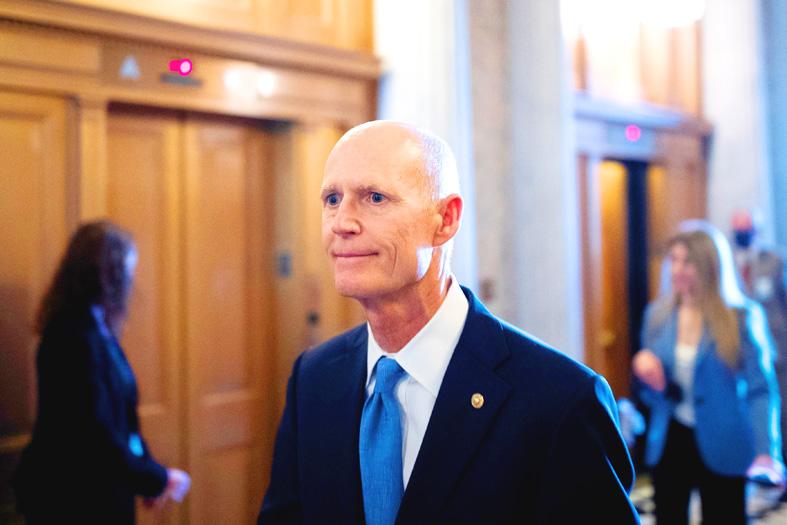US Senator Rick Scott arrived in Taiwan yesterday afternoon for a two-day visit.
Scott, who serves on the US Senate Committee on Armed Services, is the seventh US senator to visit Taiwan this year.
The Ministry of Foreign Affairs said in a statement that the Republican senator from Florida was greeted by Deputy Minister of Foreign Affairs Tien Chung-kwang (田中光).

Photo: REUTERS
Scott is scheduled to meet with President Tsai Ying-wen (蔡英文) and Premier Su Tseng-chang (蘇貞昌) during his visit, the ministry said, adding that Minister of Foreign Affairs Joseph Wu (吳釗燮) was to host a banquet to welcome him.
Scott would also have a videoconference with Bureau of Foreign Trade Director-General Yang Jen-ni (楊珍妮), who is also deputy trade representative of the Office of Trade Negotiation, the ministry said.
The American Institute in Taiwan said that Scott’s visit was “part of a larger visit to the Indo-Pacific region.”
“The senator will meet with senior Taiwan leaders to discuss US-Taiwan relations, regional security, trade and investment, global supply chains, and other significant issues of mutual interest,” the institute said.
Scott, who served as Florida governor from 2011 to 2019, has proposed several Taiwan-friendly bills in the senate, including the draft Taiwan invasion prevention act and the draft deterring communist Chinese aggression against Taiwan through financial sanctions act, the ministry said.
The senator in May cosigned a letter penned by the Senate Committee on Foreign Relations, calling on US President Joe Biden to include Taiwan in the Indo-Pacific Economic Framework, it said, adding that he has been supporter of a bilateral trade agreement between Taiwan and the US.
Scott visited the Taiwan Representative Office in Lithuania in April, becoming the first US senator to visit it, the ministry said.
In the same month, US senators Lindsey Graham, Bob Menendez, Richard Burr, Ben Sasse and Rob Portman, as well as US Representative Ronny Jackson, visited Taiwan and met with national security officials.
Another delegation led by US Senator Tammy Duckworth visited Taiwan in late May.

The Grand Hotel Taipei on Saturday confirmed that its information system had been illegally accessed and expressed its deepest apologies for the concern it has caused its customers, adding that the issue is being investigated by the Ministry of Justice Investigation Bureau. The hotel said that on Tuesday last week, it had discovered an external illegal intrusion into its information system. An initial digital forensic investigation confirmed that parts of the system had been accessed, it said, adding that the possibility that some customer data were stolen and leaked could not be ruled out. The actual scope and content of the affected data

‘LIKE-MINDED PARTNER’: Tako van Popta said it would be inappropriate to delay signing the deal with Taiwan because of China, adding he would promote the issue Canadian senators have stressed Taiwan’s importance for international trade and expressed enthusiasm for ensuring the Taiwan-Canada trade cooperation framework agreement is implemented this year. Representative to Canada Harry Tseng (曾厚仁) in an interview with the Central News Agency (CNA) said he was increasingly uneasy about Ottawa’s delays in signing the agreement, especially as Ottawa has warmed toward Beijing. There are “no negotiations left. Not only [is it] initialed, we have three versions of the text ready: English, French and Mandarin,” Tseng said. “That tells you how close we are to the final signature.” Tseng said that he hoped Canadian Prime Minister Mark Carney

President William Lai (賴清德) yesterday bestowed one of Taiwan’s highest honors on Saint Vincent and the Grenadines (SVG) Ambassador Andrea Clare Bowman in recognition of her contributions to bilateral ties. “By conferring the Order of Brilliant Star with Grand Cordon on Ambassador Bowman today, I want to sincerely thank her, on behalf of the Taiwanese people, for her outstanding contribution to deepening diplomatic ties between Taiwan and SVG,” Lai said at a ceremony held at the Presidential Office in Taipei. He noted that Bowman became SVG’s first ambassador to Taiwan in 2019 and

A man walks past elementary school artworks at the Taipei Lantern Festival in Ximen District yesterday, the first day of the event. The festival is to run from 5pm to 10pm through March 15.